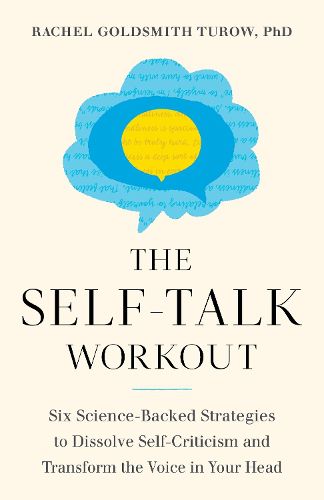Readings Newsletter
Become a Readings Member to make your shopping experience even easier.
Sign in or sign up for free!
You’re not far away from qualifying for FREE standard shipping within Australia
You’ve qualified for FREE standard shipping within Australia
The cart is loading…






Self-talk matters, but what methods of building healthy self-talk actually work? This how-to guide sharesevidence-basedtechniques togo from being your own worst critic to your own best friend.
Perhaps you want to be nicer to yourself but don’t really know how to get there. Or maybe you’re someone who assumes self-criticism is a permanent part of your personality. Rest assured you’re not alone-millions of people struggle with the toll that excessive self-criticism takeson their minds, energy levels, jobs, andrelationships. And problems with self-talk vary dramatically from one person to the next- they can appear as mild but persistent innercriticism, full-blown self-loathing, or thepainof internalizedoppression or abuse.
After over twenty years of workingwithindividuals, groups, and classes on self-criticism and related challenges, psychologist and mindfulness teacher Dr. Rachel Goldsmith Turow offers the self-talk workout -sixdoableexercisesthat canhelp you replace self-criticism with self-kindness and self-encouragement.Specific self-talk strategies such as Spot the success,
Fail forward, and Allowing all feelings, skillfully, requirejust a few minutes a day. These skills can be practiced individually totransform your self-talk, or you can choose to combine two or more exercises to enhance your self-talk workout.Each chapter features a core exercise, variations on the strategy that might feel right for you, scientific studies supporting each approach, and success stories to inspire your own practice.
Turow includesexamples from her own life and experiences as a psychotherapist, as well as lessons from her students and respected public figures such as Michelle Obama and Thich Nhat Hanh, toshow thattheburden of harsh self-criticism need not go on forever- theway that we relate to ourselves can be changed.
$9.00 standard shipping within Australia
FREE standard shipping within Australia for orders over $100.00
Express & International shipping calculated at checkout
Stock availability can be subject to change without notice. We recommend calling the shop or contacting our online team to check availability of low stock items. Please see our Shopping Online page for more details.
Self-talk matters, but what methods of building healthy self-talk actually work? This how-to guide sharesevidence-basedtechniques togo from being your own worst critic to your own best friend.
Perhaps you want to be nicer to yourself but don’t really know how to get there. Or maybe you’re someone who assumes self-criticism is a permanent part of your personality. Rest assured you’re not alone-millions of people struggle with the toll that excessive self-criticism takeson their minds, energy levels, jobs, andrelationships. And problems with self-talk vary dramatically from one person to the next- they can appear as mild but persistent innercriticism, full-blown self-loathing, or thepainof internalizedoppression or abuse.
After over twenty years of workingwithindividuals, groups, and classes on self-criticism and related challenges, psychologist and mindfulness teacher Dr. Rachel Goldsmith Turow offers the self-talk workout -sixdoableexercisesthat canhelp you replace self-criticism with self-kindness and self-encouragement.Specific self-talk strategies such as Spot the success,
Fail forward, and Allowing all feelings, skillfully, requirejust a few minutes a day. These skills can be practiced individually totransform your self-talk, or you can choose to combine two or more exercises to enhance your self-talk workout.Each chapter features a core exercise, variations on the strategy that might feel right for you, scientific studies supporting each approach, and success stories to inspire your own practice.
Turow includesexamples from her own life and experiences as a psychotherapist, as well as lessons from her students and respected public figures such as Michelle Obama and Thich Nhat Hanh, toshow thattheburden of harsh self-criticism need not go on forever- theway that we relate to ourselves can be changed.